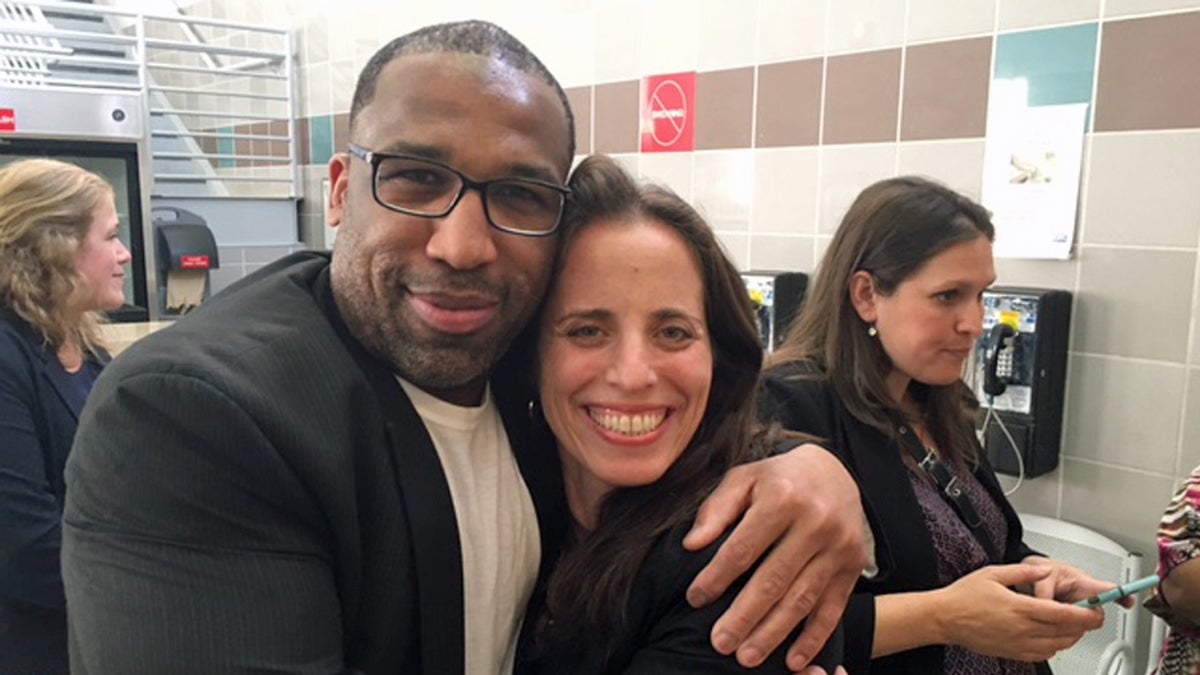After two decades in prison, Philly man released thanks to new trial and DNA evidence

Anthony Wright and Nina Morrison of The Innnocence Project
A Philadelphia man who spent nearly 25 years in prison for a 1993 murder and rape conviction based in large part on a disputed confession was found not guilty by a jury Tuesday.
He was granted the new trial after DNA tests demonstrated that another man likely committed the crime.
Anthony Wright was a 20-year-old middle-school dropout at the time he confessed to the brutal murder of Louise Talley, 77, whose body was found in the bedroom of her North Philadelphia home. The new lab results, which the Pennsylvania Supreme Court signed off on after Wright petitioned for the tests, linked the murder to another man, Ronnie Byrd, who died several years ago at 63 while incarcerated.
Wright was released Tuesday evening.
With help from the Innocence Project of New York, Wright convinced a judge to order a new lab test of the blue jeans, a sweatshirt and other items that police said he wore during the attack, in addition to a new analysis of specimens from Talley’s rape kit.
And it was enough to convince a jury.
“Tony has always maintained his innocence and asked for DNA testing. Now, we’re at the point where the DNA testing can be done to show who literally wore the clothing that he was alleged to have worn and always said he didn’t wear,” said new defense attorney Sam Silver.
At the time of Wright’s trial in 1993, the use of DNA evidence in criminal trials was in its early stages and not as widely accepted as it is today.
Wright was sentenced to life without the possibility of parole after he signed a nine-page confession to the rape and murder following physical intimidation, including his being handcuffed to a chair, according to Silver.
“The confession was a 100 percent fraud that was put upon him after hours and hours of interrogation,” Silver said. “He always said he did sign it, but always said, ‘They weren’t my words, it wasn’t my confession.” And the cross-examination of the people who said they took that confession showed full well that it simply could not have been genuine, and I think the jury appreciated that immediately.”
In 2014, a judge vacated Wright’s conviction after the results of the DNA testing came back. But Philadelphia’s district attorney’s office decided to retry the case instead of releasing him, arguing that even if Wright were not the principal perpetrator, he was an accomplice.
Yet the jury sided with the case made by Wright’s attorneys that prosecutors pinned the vicious act on the wrong guy.
“They need to admit that they made a mistake and they shouldn’t have retried this case,” Silver said of the the city’s district attorney’s office. District Attorney “Seth Williams should be asked questions about this case over and over and over again, and he should have to answer how it is, not just that the commonwealth wasted people’s money on this case, but how they kept an innocent man in prison, when they knew there was reasonable doubt at a bare minimum.”
Marissa Bluestine, legal director for the Pennsylvania Innocence Project, said her group is now examining five additional cases involving the detectives involved in the prosecution of Wright.
“From our perspective, justice is justice,” Bluestine said. “No matter how long it takes to get there.”
Philadelphia district attorney spokesman Cameron Kline said in a statement that the office led by Seth Williams respects the jury’s hard work. Despite the verdict, he said prosecutors do not regret re-trying the case.
“The District Attorney’s Office stands by its decision to retry Anthony Wright, based on the totality of the evidence,” Kline said. “The verdict only shows that the jury did not find that his guilt was proven beyond a reasonable doubt.”
WHYY is your source for fact-based, in-depth journalism and information. As a nonprofit organization, we rely on financial support from readers like you. Please give today.




